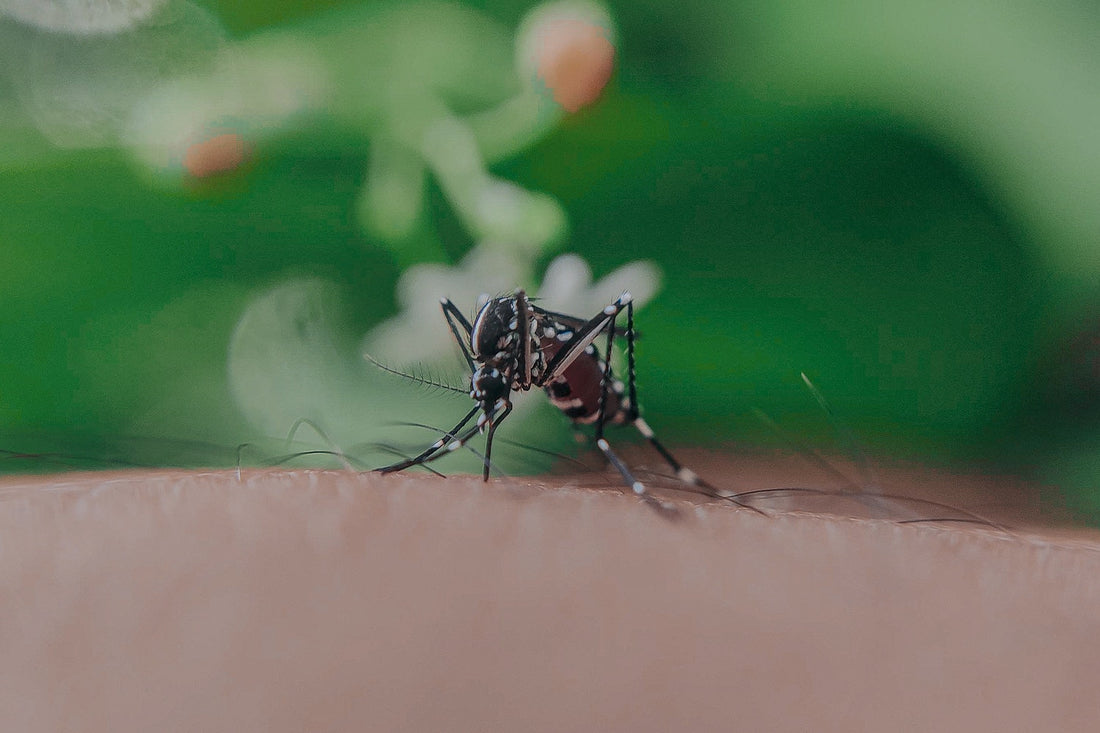If there’s anything we all know and can agree on, it’s that mosquitoes are quite pesky to have around. We spend so much time trying to get rid of them… and for a good reason. However, we’re about to get into the nitty-gritty of these buggy bugs.
The Natural Patch Co. is here today to break down some fun facts, and squash some interesting myths, to help you make better choices about avoiding mosquitoes-and maybe appreciate them. A little? No, that’s ok — we know it’s hard.
Ancient Creatures
You definitely read that right. Mosquitoes have been around since the Jurassic Period, meaning they’ve been bugging other creatures for over 200 million years. Never imagined you had your hate of mosquitoes in common with your oldest ancestors, did you?
In addition to this, there are over 3,000 different species, but thankfully, only about 100 different types are prone to nipping people. Did you know there are some species of mosquitoes that only bite birds and other animals as well as certain amphibians?
While these mosquito statistics might help you relax, don’t forget that out of these 100 varieties, many of them carry many types of illnesses that are serious. So, being vigilant about avoiding mosquitoes is a must!
Fact-Checking
Here at The Natural Patch Co., we know there are a lot of myths and common misconceptions surrounding these little insects. So, next, we are gonna break down the different things you might have heard-and, which are fact or fiction. But don’t worry, anything fiction we promise to replace with fact.
How High Do Mosquitoes Fly?
A lot of people are under the impression that mosquitoes can’t fly any higher than 25 feet. This would mean that if you live on the third or above floors of a building, your home is safe from any bites, right? False.
Most mosquitoes don’t fly super high, but some have airplane-like powers. Mosquitoes can make it all the way to the top of any high-rise building.
Scientists have documented them living at the top of the Himalayan Mountains (8,000 feet in elevation) during their breeding season. The truth is, mosquitoes prefer to fly at 25 feet or below, but this should in no way make you think it’s because they can’t do it.
A few other facts about their flight that you might, or might not know, is that they don’t like to fly far or fast. Ultimately, mosquitoes want to stay within a few hundred feet of where they have hatched or bred.
Which means no, you aren’t crazy. You’ve definitely seen more mosquitoes on that one street than that other one downtown. Mosquitoes also only fly about 1.5 miles per hour, so if you see them, you can definitely try to run away.
Why Do They Make Us Crazy?
We know even if you’ve never felt a mosquito land on your skin, you’ve learned they’re around because that buzzing makes you crazy. Their wings vibrate at 300 to 600 beats per second, which makes us hear when they’re around before we see them.
Try as we might not to love this fact, but mosquitoes that meet and decide to mate actually synchronize their wing vibrations to match each other. Now, if that doesn’t scream romance!
There is also a myth that mosquitoes, like other insects, can only live for up to 24 hours. Unfortunately for us, this isn’t true. Male mosquitoes live on an average of 10 days, but females can live for up to two months.
There is some argument out there that they can live up to six months, but most experts agree on a two-month life expectancy. What’s worse is that female mosquitoes lay eggs their entire life, which is about 300 eggs every three days. If we weren’t already itchy just from thinking about everything, this is probably the fact that’ll make it worse.
They Love the NightLife
It is a very common myth that mosquitoes only come out at night, but this couldn’t be further from wrong. While mosquitoes are likely to be more active at night, this has more to do with our activity than their need to sleep all day.
Mosquitoes prefer to roam and feed at night because winds are usually calmer, and they are safer from their enemies (aka humans). Most people and animals are asleep at night, so there is less chance of feeding on a person and being smack flat, and with animals asleep, there is less of a chance that a mosquito will be eaten or stepped on by our four-legged friends.
In addition to this, mosquitoes prefer moderate temps, so again, the late evening and early morning are prime times for their favorite climate. The dry heat of the day can keep them from coming out.
But extreme cold isn’t exactly a deal-breaker either. Mosquitoes can hibernate if the temp drops below 50 degrees. Females can lay eggs and then hibernate, and their eggs will freeze until it’s time to hatch when the temperatures are back up.
Why Do They Bite?
You might not know, but only female mosquitoes bite; they need heavy amounts of protein to lay their eggs, and blood is the best source for them. Even those that do bite humans prefer to bite animals like cattle first. But make no mistake; they aren’t going to pass up the chance at your arm if they get it.
The saliva that makes us itch is also the thing that makes us unaware when we are getting bit. Mosquitoes use their saliva as a numbing and pain-relief agent to aid them in their attempt at drinking your blood. So when you feel them after they’ve bitten you, it’s because they’re releasing their hold and have stopped emitting saliva.
Male mosquitoes only feed on the pollen and nectar of plants, and most females will also partake in the floral finds as long as they aren’t trying to lay eggs. If you feel like you just get bitten more than other people you’re around, well, that’s also not crazy.
Mosquitoes find us by our breath, meaning when we exhale carbon dioxide, they sense it and come calling. We hate to say it, but pregnant women generally release more carbon dioxide so if you’re expecting, be a little more cautious when heading out for the day.
The same goes for runners: if you prefer the outdoors and enjoy long runs outside, be prepared to be found by any mosquitoes in the area. If neither of these applies to you, well, sometimes the natural chemicals our bodies and skin release just attract mosquitoes more than others.
What Can You Do?
We threw a lot of facts at you, we know, but the more you know about what you’re up against, the better. There are plenty of things you can do to keep you and your family bite-free.
Protecting Your Home
Properly fitted, sealed, and maintained screens are a great way to keep mosquitoes from getting inside your home. If you’re someone that likes the fresh air when you’re indoors, we can’t stress enough how important this is.
A mosquito cannot fly through a well-maintained screen, so if you ever get a tear or rip in one, fix it immediately. Replacement mesh and lining are available at most home improvement stores. Add in a quick online tutorial, and you’ll be replacing the screen like a pro.
If you’ve got a green thumb and love the tranquility your garden offers you and your family, then add in certain floral plants that will repel mosquitoes. Yet, keep in mind that mosquitoes do love to lay eggs in large gardens that provide shade and protection from outside elements.
Make sure that you dump out any standing water always, as female mosquitoes lay eggs in stagnant water supplies; it only needs to be a tablespoon of water to be enough.
You can also spray your garden with water mixed with a little bit of dish soap, causing your plants to gain a necessary slickness that will make it impossible for eggs to attach. Then, the females will have to look elsewhere for breeding grounds.
Protecting Yourself
You don’t want to give up your time outdoors with your family just to keep everyone safe from mosquitoes. This is a great time to head over to our website and stock up on our BuzzPatch and MagicPatch bundles.
Our BuzzPatch is packed to the brim with all-natural essential oils that are proven to keep the mosquitoes away, so you can get back to enjoying your life in the fresh air.
And if you ever do find you or your kids scratching a bite, our MagicPatch grid technology will be able to pull the itchy saliva to the top of the skin and eliminate the need to scratch. Plus, our fun emoji designs will be a great little added bonus to your daily wardrobe.
A lot of chemicals out there promise fast and safe results. Unfortunately, you can’t trust those guarantees. Chemical insecticides and repellents are not as safe as they appear and come with a warning label. Products (like DEET) have been lifted off shelves and banned in many countries due to their adverse effects on the environment and populations.
This isn’t what we want for ourselves or our community. The Natural Patch Co. only uses all-natural ingredients that have been proven to work safely based on past ancestral practices.
Indigenous peoples have been using these essential oils longer than any of those risky chemicals were on the market, making our natural products tried and true. Using our products can give you peace of mind knowing that not only are you protecting yourself and your family, but doing so in a way that is organic and effective.
The More You Know
We hope you learned something about mosquitoes today, and maybe even a takeaway or two on how to keep your home pest-free. Many bird species rely on mosquitoes as a protein-packed food source, so as much as we would like to wish them out of existence, it just wouldn’t be fair to the birds.
Regardless of this, these facts should help you make informed decisions about how best to safeguard your home and family from any bites this year. Armed with knowledge and safe mosquito repellants, you can happily keep enjoying all the outdoor activities you love with the people you love.
Sources:
Living with parasites: A Himalayan tale of birds, mosquitoes and malaria | Research Matters


